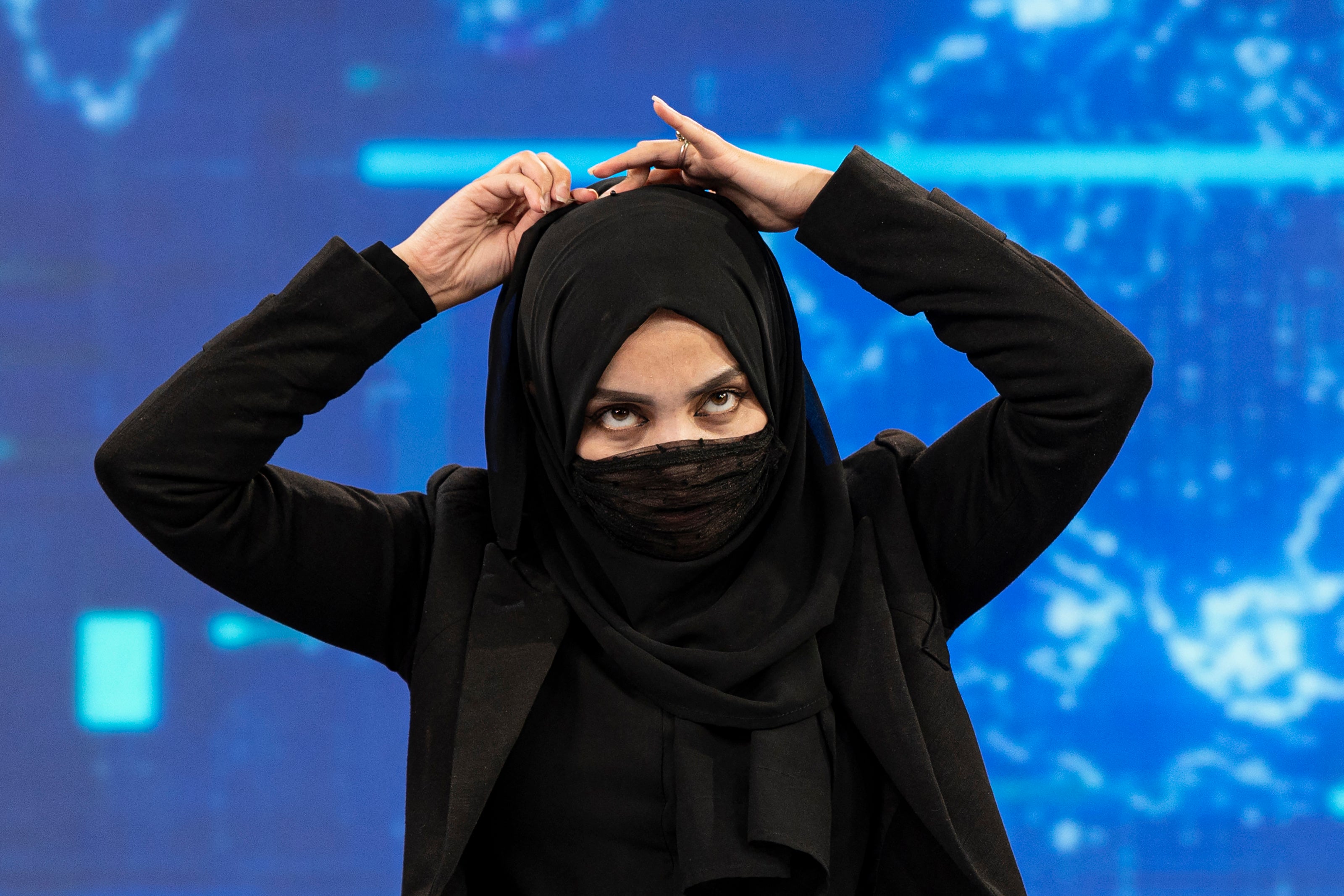Taliban to ban women from working in TV if they do not cover their faces
Taliban asks TV channels in Kabul to avoid interviews with Afghan women ‘who do not adhere to hijab’

Your support helps us to tell the story
From reproductive rights to climate change to Big Tech, The Independent is on the ground when the story is developing. Whether it's investigating the financials of Elon Musk's pro-Trump PAC or producing our latest documentary, 'The A Word', which shines a light on the American women fighting for reproductive rights, we know how important it is to parse out the facts from the messaging.
At such a critical moment in US history, we need reporters on the ground. Your donation allows us to keep sending journalists to speak to both sides of the story.
The Independent is trusted by Americans across the entire political spectrum. And unlike many other quality news outlets, we choose not to lock Americans out of our reporting and analysis with paywalls. We believe quality journalism should be available to everyone, paid for by those who can afford it.
Your support makes all the difference.The Taliban will ban women media workers in Kabul if they fail to adhere to a “modest dress code” which includes face veils, said an independent media body that operates in Afghanistan.
Abdul Ghaffar Farooq, Taliban’s spokesperson for the Ministry of the Promotion of Virtue and Prevention of Vice, suggested that media representatives “adhere to a modest dress code, showing images of women in black attire and veils with their faces mostly covered, leaving only their eyes visible”, the Afghanistan’s Journalists Centre said in a statement on Wednesday.
News channels in Kabul should avoid interviews with Afghan women “who do not adhere to the hijab or fully cover their faces”, the spokesperson suggested.
The meeting was attended by officials from the hardline Islamist regime, including the minister of the promotion of virtue and prevention of vice, Mohammad Khaled Hanafi, and other media representatives, AFCJ said.
Any failure to comply with these unofficial guidelines will lead to a potential prohibition of women working in the media by the Taliban’s supreme leader Hebatullah Akhundzada, the AFCJ said, citing Mr Hanafi.
“AFJC has expressed concern over the state of the media in the country and the potential repercussions of banning women from working in the media, who already face significant restrictions in their work,” the organisation said, warning that the move can lead to another ban on women working in Afghanistan’s public domains.
The independent organisation monitoring press freedom in the Taliban-ruled country said it is “deeply concerned about the state of the media in the country and cautions against the potential issuance of an order that would prohibit women from working in the media”.
It pointed out how the country’s media professionals are struggling with already existing stringent work conditions.
Taliban authorities should revoke its guidelines on media and allow journalists the freedom to exercise their rights, the AFJC said.
Journalists in the Taliban-ruled Afghanistan have faced massive clampdown on their freedom to report on the country as they continue to operate under several directives by the group.
Some of these directives target women directly and prohibit them from working in national radio and television, and a larger ban on women’s voices and phone calls from being broadcast in certain provinces.
Shortly after taking over Kabul, the Taliban released a set of restrictions on Afghan media, including banning television dramas that included female actors and ordering women news presenters to wear “Islamic hijab”.
Some edicts were targeted specifically at women, a move likely to raise concerns among the international community.
“Those dramas...or programmes in which women have acted, should not be aired,” the rules said, adding that female journalists on air should wear “Islamic hijab” without defining what that meant.
Though most women in Afghanistan wear headscarves in public, the Taliban’s statements that women should wear “Islamic hijab” have often in the past worried women’s rights activists who say the term is vague and could be interpreted conservatively.
Join our commenting forum
Join thought-provoking conversations, follow other Independent readers and see their replies
Comments